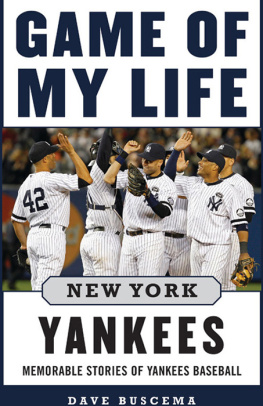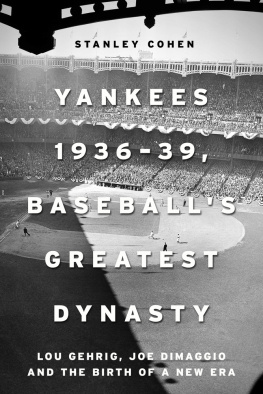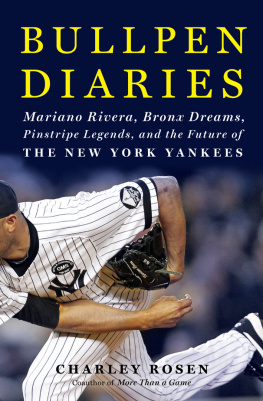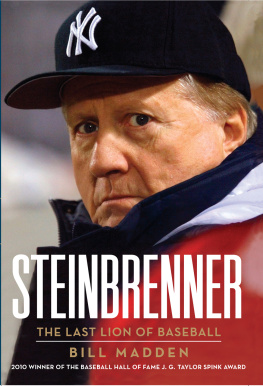Contents
Prologue
Mariano Rivera sometimes paused to stand behind the crowd of
George Steinbrenner would never entrust his team to God. That
The Yankees were sure they would see a sliver of
Gene Michael had a ticket for Game 7, and he
Before the bottom of the first inning of Game 7
Luis Sojo stood at the railing of the Yankees dugout
Steve Finley led off the bottom of Game 7s second
The Yankees had to keep Game 7 close early because
Some of the Arizona players had entered Game 7 of
An excruciating noise often jarred Mary Cashman out of her
Baseball had filled David Cones autumns for most of a
The balance of power in the American League East seemed
For all of the Yankees veterans, a rookie with crude
Hal Newhouser had thought Derek Jeter would play in many
Luis Gonzalez and Tino Martinez had been high school teammates,
In the fall of 2001, Darryl Strawberry was in the
The Sunday of Game 7 was supposed to be a
John Sterling hunted down Joe Torre before every game, stepping
The Yankees closer preferred to watch the first few innings
Chuck Knoblauch and Scott Brosius ran off the field together
Curt Schilling was sitting on the Arizona bench when Graces
The victory parade that would have taken the Yankees up
Prologue
still had time to come back. Eighth inning, Game 6, 2003 World Series, in Yankee Stadium, and they were down 20 to the Florida Marlins, seemingly at the mercy of 23-year-old Josh Beckett. The Marlins pitcher had barely enough facial hair to form a goatee, but he had blown away the Yankees in the first seven innings, his fastball hissing, his curveball arcing through the strike zone. Beckett and his teammates needed only a handful of outs to become the first visiting team in 22 years to splash Champagne in the Yankees home.
But the Yankees had often come back under dire circumstances during Joe Torres tenure as manager. Twenty-five of their 56 postseason victories from 1996 to 2001 occurred after they had fallen behind; it was a trademark of those teams. And Beckett was working Game 6 on short rest, something he had never done before. A walk or a single and then perhaps the Yankees would start piecing something together. Maybe Beckett would start to tire.
But in the executive offices high above the field, George Steinbrenner had decided the game was over and had already begun laying out the early schedule for the Yankees off-season reconstruction.
This was not unusual. Before the Yankees had come back to win the 1996 World Series, Steinbrenner had complained that the Yankees would be a national embarrassment, and yet even after they won that World Series and three of the next four, establishing baseballs first dynasty since the advent of free agency, Steinbrenners pessimism intensified. The better the team did, it seemed, the more he had to lose and the more panicked he became, his hyperventilating beginning in the first innings of each postseason series and evolving into anger and hopelessness. When Steinbrenner had publicly praised his players for their resilience, his comments had amused many of his front-office employees; they thought that Steinbrenner, at heart, was a quitter.
Some of his executives believed Steinbrenner had tactical reasons for forecasting doom; by expressing his doubts early he would position himself to say I told you so and assign blame. After defeat, he was imperturbable, stepping back and reloading. But in the midst of the competition, he expected only failure. Five innings into Game 2 of the 2003 playoffs, after the Yankees had missed on scoring chances repeatedly, Steinbrenner had summoned general manager Brian Cashman and begun berating him. Youre horseshit, and youre overpaid, Steinbrenner snapped, reminding Cashman of his frequent warnings that the team was flawed. No one will take your contract off my hands. Lou Lamoriello, the general manager of the New Jersey Devils, was in the room, along with Yankees president Randy Levine, and their presence only made the situation more tense. Maybe the Mets will take you, Steinbrenner barked. You have permission to talk to the Mets.
The Yankees had gone on to knock off Minnesota and then Boston in the American League playoffs, but in Steinbrenners world, only the World Series mattered, and in the eighth inning of Game 6, Beckett was sticking it to the Yankees, and Steinbrenner was fuming. He cornered Cashman. Meeting in Tampa Monday, he said. And its not going to be pleasant.
Alfonso Soriano singled to lead off the bottom of the eighth for the Yankees, but Beckett got out of that inning and cut down the Yankees in order in the ninth, tagging out Jorge Posada on a dribbler along the first-base line to end the game. The Marlins shouted and screamed like a Little League team as Torre and others watched from the Yankees dugout.

IN PAST years, the Yankees had played with that kind of unrestrained joy, too. They had leaped and hollered and wept when they beat Atlanta in 1996; older Yankees would remember the home-stadium crowds from that postseason as the most passionate they had seen. They had been knocked out of the first round of the 1997 playoffs, then played 1998 with extraordinary focus, winning 125 games and the World Series. They had hung together through the hard year of 1999, through the diagnosis and treatment of Torres cancer and the family deaths endured by several players, and then become the first team in more than a quarter century to win three consecutive World Series, when they beat the Mets in 2000. And in 2001, in the wake of September 11, they had played for a devastated city.
But by 2003, only eight Yankees remained from the championship yearsBernie Williams and Mariano Rivera, Derek Jeter and Jorge Posada, Jeff Nelson and Andy Pettitte, and David Wells and Roger Clemens. The others in the Yankees clubhouse had inherited the legacy, and like second-generation scions, they found that everything they did was held up against the daunting standards of years before. The burden of those expectations weighed on the team, especially the newcomers: they could prepare thoroughly and play well throughout the regular season, win the American League East and a couple of playoff series, and none of that would matter unless they won the World Series. Pitcher Mike Mussina had glanced at the standings at the end of the 2003 regular season, which Steinbrenner had filled with harping about the supposed failures of the coaching staff, and was stunned to see that the Yankees actually had won 101 gamesjust the third time in the last 23 seasons that they had racked up 100 victories. It was the worst and hardest 101-win season imaginable, Mussina thought.
AFTER LOSING to the Marlins in Game 6, the Yankees filed into their clubhouse, more weary and disgusted than disappointed. Don Zimmer, the Yankees bench coach since the championship run began in 1996, dressed quickly and met with a small group of reporters, sputtering angrily about Steinbrenner and announcing that he was fed up with the owner and intended to quit. That morning Zimmer had woken up with plans to blast Steinbrenner publicly, but his wife had talked him out of going too far. Zimmers bitterness saturated his words anyway. The only thing I can say is that for 25 years, Steinbrenner has called me Zimmer and Ive called him the Boss, Zimmer said. Hes no longer the Boss. Hes just Steinbrenner.









